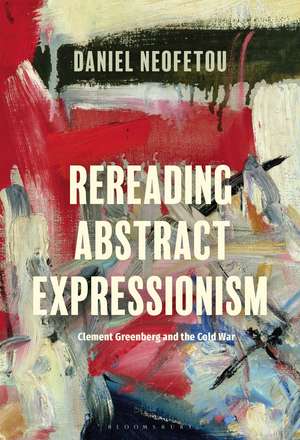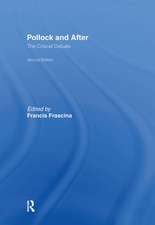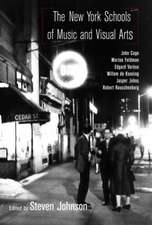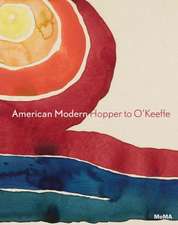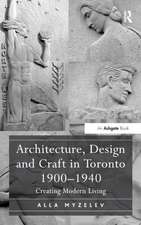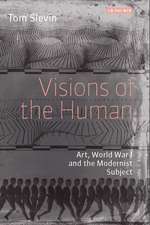Rereading Abstract Expressionism, Clement Greenberg and the Cold War
Autor Daniel Neofetouen Limba Engleză Hardback – 20 oct 2021
Preț: 569.87 lei
Preț vechi: 816.57 lei
-30% Nou
Puncte Express: 855
Preț estimativ în valută:
109.05€ • 116.61$ • 90.92£
109.05€ • 116.61$ • 90.92£
Carte disponibilă
Livrare economică 27 martie-10 aprilie
Preluare comenzi: 021 569.72.76
Specificații
ISBN-13: 9781501358388
ISBN-10: 1501358383
Pagini: 240
Ilustrații: 15 bw illus
Dimensiuni: 152 x 229 x 21 mm
Greutate: 0.56 kg
Editura: Bloomsbury Publishing
Colecția Bloomsbury Visual Arts
Locul publicării:New York, United States
ISBN-10: 1501358383
Pagini: 240
Ilustrații: 15 bw illus
Dimensiuni: 152 x 229 x 21 mm
Greutate: 0.56 kg
Editura: Bloomsbury Publishing
Colecția Bloomsbury Visual Arts
Locul publicării:New York, United States
Caracteristici
Provides a philosophical corrective to the still hegemonic accounts of Abstract Expressionism as complicit with the status quo, taking as representative of the movement not only the most famous (white male) artists, but pays as much attention to figures such as Joan Mitchell and Norman Lewis
Notă biografică
Daniel Neofetou completed his PhD at Goldsmiths in 2018. He has taught at Birkbeck, the University of Edinburgh, the University of Applied Sciences and Arts Northwestern Switzerland, and the Fordham University London Center. He is the author of Good Day Today: David Lynch Destabilises the Spectator (2015) and is a regular contributor to Art Monthly and The Wire.
Cuprins
Introduction1. Greenberg's Trotskyism2. Figuring Negation3. Making Things of Which We Know Not What They Are4. Greenberg's Kantianism contra Greenberg's Positivism5. The Silent World of the Sensible6. Denunciation and AnticipationEpilogueBibliographyIndex
Recenzii
In relating Greenberg's post-'Kitsch' and 'Laocoon' writing to Adorno, Neofetou brilliantly grounds the thesis that Abstract Expressionism's determinate negation of content-based (that is, what Adorno calls Inhalt) thinking portends the determinate negation of unfreedom. The book will well service readers already familiar with some of the revisionist literature on Abstract Expressionism and best reward specialists familiar with the more recent responses to these revisionist accounts.
The scope and ambitions of Rereading Abstract Expressionism is very different, but also very clear and powerful ... Rereading Abstract Expressionism is an important contribution to the study of abstract expressionism and its one-sided reception in post-Greenbergian years. It is now time to go back to the paintings themselves and to check the validity of his very stimulating new interpretations of the discourses that have "made" abstract expressionism what it was and today no longer is, namely the promise of an absolute and absolutely liberating art.
The scope and ambitions of Rereading Abstract Expressionism is very different, but also very clear and powerful ... Rereading Abstract Expressionism is an important contribution to the study of abstract expressionism and its one-sided reception in post-Greenbergian years. It is now time to go back to the paintings themselves and to check the validity of his very stimulating new interpretations of the discourses that have "made" abstract expressionism what it was and today no longer is, namely the promise of an absolute and absolutely liberating art.
